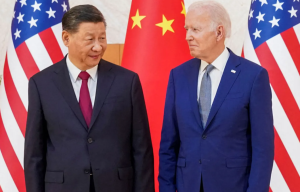The Biden administration’s approach of fostering a cooperative relationship with China has faced scrutiny, with experts expressing disappointment over limited gains and a perceived failure to leverage obtained concessions. According to analysts, the United States has not effectively capitalized on the minimal concessions secured from China, raising concerns about the overall effectiveness of the current strategy.

Gordon Chang, a China expert and senior fellow at the Gatestone Institute, highlighted the primary outcome of the approach, stating, “The one thing that we’ve got is time.” He pointed out that the U.S. is not adequately prepared to defend itself and its allies, and the efforts to appease China have merely bought a brief respite. Chang emphasized that despite the administration buying time, there has been insufficient action by the Pentagon, leading to a perception that valuable time has been wasted without substantial gains.
Chang stressed the need for a policy shift, stating, “Clearly, the United States is no longer deterring China as we once did, so this is the time to change a policy that has worked but is no longer sufficient in today’s setting.”
In 2022, President Biden and Chinese President Xi Jinping held their first face-to-face meeting since Biden assumed office, attending the G-20 summit in Indonesia. Additionally, Xi visited the U.S. in the same year, meeting with Biden in San Francisco during the Asian-Pacific Economic Cooperation conference. The leaders agreed on military-to-military communications and committed to addressing the production and distribution of fentanyl, a significant issue originating from China and Mexico.
The Biden administration’s approach, as outlined by National Security Advisor Jake Sullivan at the World Economic Forum in Davos, emphasizes competition with China across various dimensions while aiming to avoid confrontation. Sullivan highlighted the resumption of military-to-military communications and emphasized its positive impact on regional and global stability, reducing the risk of unintended conflict.
However, critics like Gordon Chang argue that the administration has failed to take decisive action in response to the significant impact of COVID-19 and the fentanyl crisis, both traced back to China. Chang pointed out that over 1.1 million Americans lost their lives to the pandemic, and over 73,000 Americans succumbed to fentanyl overdoses in 2022.
As the administration navigates the complex dynamics of the U.S.-China relationship, the criticisms underscore the need for a comprehensive and strategic approach that addresses not only geopolitical concerns but also pressing issues affecting American lives. The debate surrounding the effectiveness of the current policy highlights the challenges and complexities inherent in managing relations with a major global player like China.

